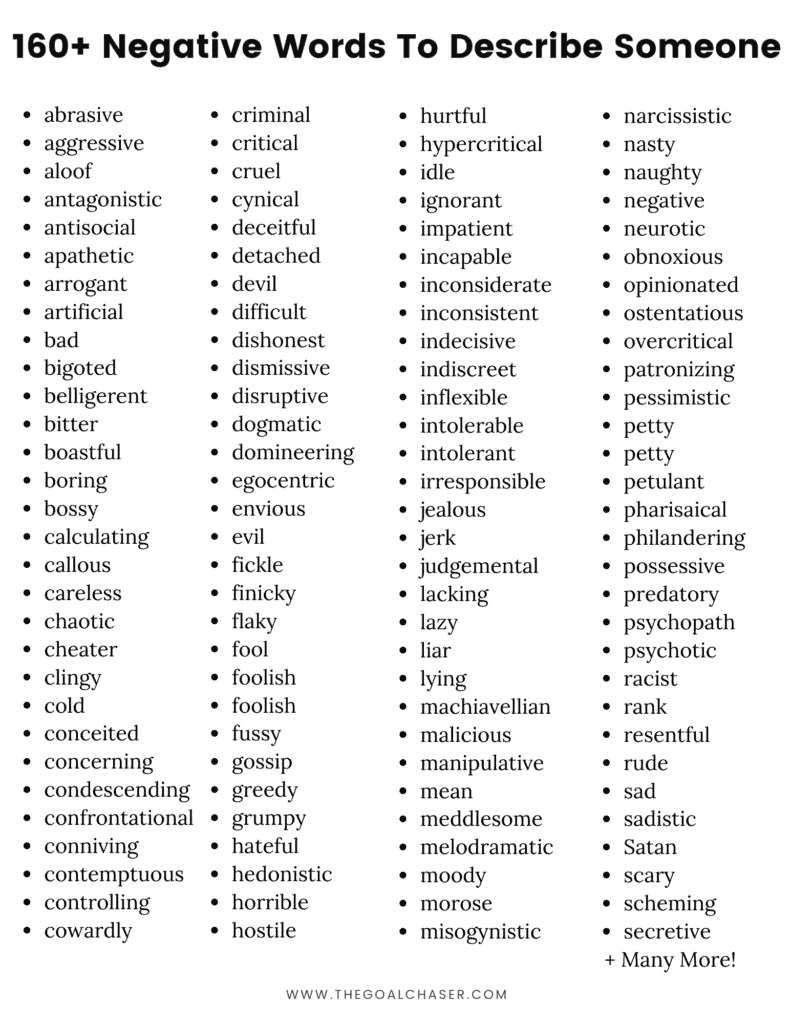160+ Negative Words to Describe Someone – List of Adjectives
An enormous list of negative words to describe someone.
Words come with a lot of meaning. Sometimes they invoke positive feelings and sometimes they invoke negative ones.
The word you use to describe someone says a lot about how you feel about them and can also be used to describe someone’s mood, their appearance, their abilities (or lack of), their opinions or their personality.
A few examples include ‘lazy’, ‘stupid’, ‘ugly’, ‘annoying’, and ‘rude’.
Each of these words carries a different connotation, so it’s important to choose the right one to fit your situation.
It really all depends on the context and your relationship with the person you’re describing. But no matter what, using negative words to describe someone is always going to have a negative effect. So choose your words carefully!
Related: 350+ Positive Words to Describe Someone – List of Adjectives
Negative Adjectives You Can Use To Describe Someone
Negative adjectives (aka ‘describing words’) can help us to describe someone’s characteristics, in a negative way. To give you some ideas beyond horrible, bad and mean, here is a long and thorough list of more than 160 negative words and adjectives, all listed A-Z:
- Abrasive – someone who is harsh, rude, and unpleasant to interact with.
- Aggressive – quick to attack, confront, or criticize others.
- Aloof – distant, reserved, and indifferent towards others.
- Antagonistic – someone who is hostile, confrontational, and uncooperative towards others.
- Antisocial – avoids social interactions, prefers to be alone, and lacks empathy towards others.
- Apathetic – lacks interest, enthusiasm, and motivation towards everything around them.
- Arrogant – someone who has an exaggerated sense of importance and superiority over others.
- Artificial – a person who is insincere, fake, and pretentious in their behavior.
- Bad – has a negative attitude, lacks morals, and is generally unpleasant to be around.
- Bigoted – intolerant and prejudiced towards individuals or groups that are different from them.
- Belligerent – hostile, aggressive, and ready to start a fight or argument.
- Bitter – someone who is resentful and holds grudges against others.
- Boastful – someone who brags excessively about their achievements, skills, or possessions.
- Boring – someone who lacks excitement, energy, and enthusiasm towards everything around them.
- Bossy – someone who tries to control others, give orders, and dictate how things should be done.
- Calculating – someone who is manipulative and strategic in their actions, often with a hidden agenda.
- Callous – someone who is insensitive, unfeeling, and indifferent to the suffering of others.
- Careless – lacks attention to detail, is irresponsible, and prone to making mistakes.
- Chaotic – disorganized, unpredictable, and lacks structure in their life.
- Cheater – someone who cheats or deceives others for personal gain or advantage.
- Clingy – overly dependent, needy, and doesn’t allow others space or freedom.
- Cold – someone who lacks warmth, emotion, and affection towards others.
- Conceited – vain, narcissistic, and excessively proud of their appearance or abilities.
- Concerning – causes worry, anxiety, and unease due to their behavior or actions.
- Condescending – talks down to others, belittles their intelligence or abilities.
- Confrontational – confrontational, aggressive, and quick to argue or fight.
- Conniving – someone who is deceitful, manipulative, and scheming.
- Contemptuous – holds others in disdain, disrespect, and treats them with contempt.
- Controlling – someone who seeks to control others, their actions, and their behavior.
- Cowardly – lacks courage, is easily intimidated, and avoids facing their fears.
- Criminal – someone who breaks the law, engages in illegal activities, and puts others at risk.
- Critical – overly critical, judgmental, and harsh towards others.
- Cruel – someone who enjoys inflicting pain or suffering on others, lacks empathy, and is sadistic.
- Cynical – distrustful, skeptical, and sees the worst in people or situations.
- Deceitful – dishonest, deceptive, and manipulative towards others.
- Detached – emotionally distant, uninvolved, and unresponsive towards others.
- Devil – someone who is considered wicked, evil, or malevolent.
- Difficult – hard to please, stubborn, and challenging to work with.
- Dishonest – not truthful, deceives others, and lacks integrity.
- Dismissive – someone who ignores, belittles, or rejects the ideas or opinions of others.
- Disruptive – someone who causes chaos, disorder, and disruption in social or work environments.
- Dogmatic: stubbornly opinionated and inflexible in their beliefs, often to the point of being closed-minded or unwilling to consider other perspectives.
- Domineering: controlling, overbearing, and tends to impose their will on others, often using force or intimidation to get their way.
- Egocentric: excessively self-centered, often to the point of being selfish or narcissistic, and tends to think only of themselves.
- Envious: jealous or resentful of others’ success or possessions and may act spiteful or malicious as a result.
- Evil: intentionally and maliciously causes harm to others, often without remorse or empathy for their victims.
- Fickle: unpredictable and tends to change their opinions or feelings frequently and without warning.
- Finicky: A person who is excessively particular or demanding, often about minor details or preferences, and can be difficult to please.
- Flaky: a person who is unreliable, inconsistent, or prone to canceling plans or not following through on commitments.
- Fool: lacks good judgment or common sense, and often makes poor decisions or acts foolishly.
- Foolish: lacks wisdom or good judgment, and often makes poor decisions or acts unwisely.
- Fussy: someone who is overly picky or particular about things, often making a big deal out of small details or inconveniences.
- Gossip: a person who spreads rumors or personal information about others, often without regard for the truth or the potential harm it may cause.
- Greedy: excessively focused on accumulating wealth or possessions, often at the expense of others or their own well-being.
- Grumpy: irritable, easily annoyed, and tends to have a negative or pessimistic outlook on life.
- Hateful: a person who expresses strong negative feelings or prejudice towards others, often based on their race, religion, or other characteristics.
- Hedonistic: focused on maximizing pleasure and avoiding pain, often at the expense of others or their own long-term well-being.
- Horrible: extremely unpleasant or offensive, often causing fear, disgust, or revulsion in others.
- Hostile: aggressively unfriendly or antagonistic towards others, often expressing anger or resentment.
- Hurtful: intentionally or unintentionally causes emotional pain or distress to others through their words or actions.
- Hypercritical: excessively critical or judgmental of others, often focusing on minor flaws or mistakes and ignoring positive qualities.
- Idle: lazy or inactive, often wasting time or neglecting responsibilities.
- Ignorant: a person who lacks knowledge or understanding about a particular topic or issue, often leading to misunderstandings or mistakes.
- Impatient: a person who is easily frustrated or annoyed by delays or obstacles, often acting impulsively or without thinking things through.
- Incapable: lacks the ability or skill to do something, often leading to frustration or feelings of inadequacy.
- Inconsiderate: thoughtless or insensitive towards others, often ignoring their feelings or needs.
- Inconsistent: unpredictable or unreliable, often changing their behavior or opinions without warning.
- Indecisive: a person who has difficulty making decisions or committing to a course of action, often leading to indecision or procrastination.
- Indiscreet: careless or imprudent in their speech or actions, often revealing sensitive information or causing embarrassment.
- Inflexible: unwilling to change or compromise.
- Intolerable: unbearable or unacceptable.
- Intolerant: not accepting or respecting different opinions or behaviors.
- Irresponsible: not reliable or trustworthy, lacking in responsibility.
- Jealous: feeling or showing envy or resentment toward someone else’s achievements, possessions, or success.
- Jerk: a contemptible or unpleasant person.
- Judgemental: having or displaying an overly critical point of view or opinion.
- Lacking: deficient or missing in a particular quality or attribute.
- Lazy: unwilling to work or exert oneself, idle.
- Liar: someone who habitually tells falsehoods.
- Lying: not telling the truth or deliberately deceiving.
- Machiavellian: characterized by cunning, deceit, and a willingness to do whatever it takes to achieve one’s goals.
- Malicious: intending to harm or cause suffering to others.
- Manipulative: seeking to influence or control others in a dishonest or unfair way.
- Mean: unkind or spiteful.
- Meddlesome: interfering in other people’s affairs without being asked or invited.
- Melodramatic: exaggerated and overly emotional.
- Moody: prone to unpredictable or fluctuating moods.
- Morose: gloomy or sullen in disposition.
- Misogynistic: exhibiting a dislike or prejudice against women.
- Narcissistic: having an excessive interest in oneself and one’s own needs, often to the detriment of others.
- Nasty: unpleasant or disagreeable.
- Naughty: mischievous or disobedient.
- Negative: pessimistic or disapproving.
- Neurotic: excessively anxious or sensitive.
- Obnoxious: someone who is unpleasant or offensive, often in a loud or pushy way.
- Opinionated: holds strong opinions and is unwilling to consider alternative viewpoints.
- Ostentatious: someone who shows off their wealth or possessions in a flashy or pretentious way.
- Overcritical: excessively harsh or judgmental in their criticism.
- Patronizing: someone who talks down to others and treats them as if they are less intelligent or capable.
- Pessimistic: someone who has a negative outlook on life and tends to focus on the worst possible outcomes.
- Petty: overly concerned with small or trivial matters, often to the point of being vindictive.
- Petulant: easily annoyed or angered, often over minor issues.
- Pharisaical: hypocritical and judgmental of others, often while claiming to be morally superior.
- Philandering: someone who is unfaithful in their romantic relationships and has multiple sexual partners.
- Possessive: excessively jealous and controlling of their romantic partner or possessions.
- Predatory: someone who preys on others, often for personal gain or pleasure.
- Psychopath: someone who lacks empathy and remorse, and engages in dangerous or criminal behavior.
- Psychotic: someone who experiences a loss of touch with reality and may exhibit bizarre or dangerous behavior.
- Racist: holds prejudiced views or engages in discriminatory behavior against people of a certain race or ethnicity.
- Rank: foul-smelling or disgusting in appearance or behavior.
- Resentful: harbors feelings of bitterness or anger towards others, often over perceived slights or injustices.
- Rude: impolite or disrespectful towards others.
- Sad: deeply unhappy or depressed.
- Sadistic: someone who derives pleasure from inflicting pain or suffering on others.
- Satan: refers to the biblical figure of Satan, who is traditionally depicted as evil and opposed to God.
- Scary: inspires fear or terror in others.
- Scheming: someone who is devious or manipulative, often in pursuit of personal gain.
- Secretive: mysterious, often to the point of being suspicious or untrustworthy.
- Selfish: someone who is primarily concerned with their own interests, often at the expense of others.
- Sexist: holds prejudiced views or engages in discriminatory behavior against people of a certain gender.
- Shifty: someone who is evasive or unreliable, often in a suspicious or deceitful way.
- Sneaky: deceptive or untrustworthy, often in pursuit of personal gain.
- Sulky: sullen or withdrawn, often in a childish or immature way.
- Sullen: gloomy or bad-tempered, often refusing to engage with others.
- Supercilious: someone who is arrogant or condescending, often looking down on others.
- Thoughtless: acts without thinking or consideration for others, often causing harm or offense.
- Tricky: deceitful or cunning in their actions, often with the intention of manipulating others.
- Troublesome: someone who causes difficulties or problems for others, often through their behavior or actions.
- Twisted: has a distorted or perverted way of thinking, often leading to harmful or malicious behavior.
- Ugly: an unpleasant or unattractive appearance or behavior.
- Uncivilized: someone who is lacking in manners, social graces, or cultural sophistication.
- Underhanded: someone who behaves in a sneaky or deceitful manner, often with the intention of achieving personal gain or advantage.
- Unenthusiastic: lacks energy, interest, or passion for a particular task or activity.
- Uneven: inconsistent or irregular in their behavior or performance, often causing difficulties or confusion for others.
- Unforgiving: unwilling or unable to forgive others, often holding grudges or harboring resentment.
- Unhelpful: someone who is not willing or able to provide assistance or support to others, often causing inconvenience or difficulty.
- Unhinged: mentally unstable or emotionally disturbed, often displaying irrational or unpredictable behavior.
- Unjust: behaves in a way that is unfair or morally wrong, often causing harm or disadvantage to others.
- Unkept: untidy, disheveled, or generally neglectful in their appearance or behavior.
- Unkind: someone who behaves in a cruel, insensitive, or uncompassionate manner, often causing emotional pain or distress.
- Unmotivated: someone who lacks the drive, ambition, or initiative to pursue goals or accomplish tasks.
- Unpredictable: erratic or inconsistent in their behavior or actions, making it difficult to anticipate or understand their motivations.
- Unreliable: not dependable or trustworthy, often failing to follow through on commitments or promises.
- Unruly: someone who is disobedient or difficult to control, often causing disruption or chaos.
- Untrusting: suspicious or skeptical of others, often lacking confidence in their motives or intentions.
- Untrustworthy: someone who cannot be trusted, often engaging in deceitful or dishonest behavior for personal gain.
- Vacuous: someone who is empty-headed or lacking in intelligence or substance, often appearing superficial or shallow.
- Vague: unclear or imprecise in their communication or thinking, often causing confusion or uncertainty for others.
- Vain: excessively focused on their appearance, status, or achievements, often to the point of arrogance or narcissism.
- Vapid: dull or uninteresting, lacking in originality or creativity.
- Vengeful: someone who seeks revenge or retribution against others, often harboring grudges or holding onto past hurts.
- Vile: extremely unpleasant or disgusting, often behaving in a cruel or malicious manner.
- Vindictive: spiteful or resentful, often seeking to harm others in retaliation for perceived wrongs.
- Violent: prone to aggressive or destructive behavior, often causing harm or injury to others.
- Vulgar: crude, rude, or offensive in their behavior or speech, often lacking in good taste or manners.
- Weak: someone who lacks strength, courage, or resilience, often displaying a lack of conviction or confidence.
If you’re interested in more adjectives and word lists, be sure to check out:






